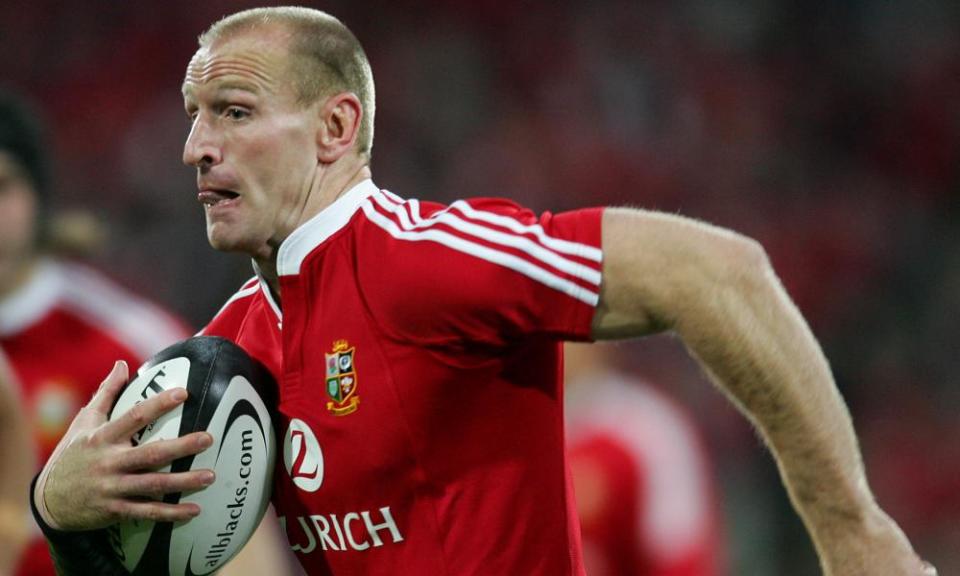Gareth Thomas revealing HIV status will 'tackle stigma'

Gareth Thomas’s decision to reveal he is living with HIV will have a “massive impact” in helping to dispel myths and stigma around the condition, the head of the Terrence Higgins Trust has said.
The former Wales and British Lions rugby captain revealed on Sunday that he tested as HIV positive a number of years ago. By speaking openly, Thomas said he hopes to educate and empower others in the same position.
Jeremy Corbyn, Stephen Fry, Kelly Holmes and Prince William were among those to tweet messages of support, with the latter writing: “Courageous as ever – legend on the pitch and legend off it. You have our support Gareth. W.”
Thomas, who on Sunday completed a 140.6-mile Ironman triathlon, has gone public after blackmailers threatened to reveal his secret and tabloid journalists went to the house of his parents.
He told the Sunday Mirror: “I’ve been living with this secret for years. I’ve felt shame and keeping such a big secret has taken its toll.
“I was in a dark place, feeling suicidal. I thought about driving off a cliff. To me, wanting to die was just a natural thought and felt like the easier way out, but you have to confront things.”
Thomas, 45, said he “broke down” when he got the news of his diagnosis. “When [the doctor] said those words ... I immediately thought I was going to die. I felt like an express train was hitting me at 300mph. Then I was thinking ‘how long have I got left?”’

Ian Green, chief executive of the Terrence Higgins Trust, said medical advances meant that someone effectively treated for HIV can have a normal life expectancy and cannot pass the virus on to their partner.
“That has all changed but what hasn’t changed is the stigma,” he told the Guardian. “For Gareth to talk openly about living with HIV is going to have a massive impact in tackling the stigma that still exists, but also to normalise HIV as just a standard long-term medical condition that people can live a normal life with.”
Green, who has lived with HIV himself for 23 years, said the stigma existed in many different ways and settings. “There are still people who face stigma in healthcare when they go and see their doctor or dentist.
“People face it in relationships. We did a survey which found 50% of people would not want to date somebody who is living with HIV even though there is no risk of transmission. Gareth’s disclosure, his decision to tell his story, is huge.”
Thomas made the revelation ahead of competing in one of the world’s toughest Ironman challenges, one that involves swimming 2.4 miles in Carmarthen Bay, cycling 112 miles through Pembrokeshire national park and running a full marathon in and around the seaside town of Tenby. He finished the event in 12 hours, 18 minutes and 29 seconds, coming 413th out of 2,039 participants.
Green was there on Sunday to cheer Thomas on. “He started at 7am. He told me that he hopes to finish in daylight, which will be about 7pm this evening. Before he started this he couldn’t swim … he is an extraordinary man.”
Thomas, nicknamed Alfie, came out as gay in 2009 and remains one of the few professional team sportspeople to have done so.
He approached the Trust six months ago asking it to take part in a BBC Wales documentary which is due to be screened on Wednesday.
Related: Rugby star Gareth Thomas: ‘I want a black-and-white law so people can deal with homophobia’
“We have become really good friends,” said Green. “I hope I’ve been there to support him in what has been quite an emotional time for him, but one that he has coped with remarkably well.
“Gareth really is passionate about making a difference … he sees it as a long-term commitment to eradicating HIV stigma, it is an absolute passion. We are very lucky to have someone like Gareth advocating for people living with HIV.”
Thomas explains his motivation in a short, powerful clip from the documentary. Trying to hold back tears, his voice breaking, Thomas said: “The reason I’m doing this is because firstly I want to remember what it’s like to live again.
“I want to remember what it’s like to feel free. And by doing that … I want to empower so many other people who are in exactly the same position as me, and probably ten times worse, to be able to feel free as well.
“And to do that I have to educate myself. I have to be strong. I have to be at the end of it a completely different person to the person I am now.
“I think what I want to learn more than anything … is that, I’ve got HIV and it’s OK, like. That’s what I want to learn more than anything.”
The documentary will tell how blackmailers forced him to go public. At one point he had to consult lawyers after a tabloid newspaper found out about his HIV status and journalists went to his parents’ home.
Thomas posted a confessional video on Twitter in which he talks about it being his secret to reveal, “not the evils that made my life hell, threatening to tell you before I do.
“Even though I have been forced to tell you this, I choose to fight, to educate and break the stigma around this subject.”
Thomas, who will be a pundit for ITV in the upcoming rugby world cup, also reveals that he married his husband Stephen three years ago.
In the UK and Ireland, Samaritans can be contacted on 116 123 or email jo@samaritans.org or jo@samaritans.ie. In the US, the National Suicide Prevention Lifeline is 1-800-273-8255. In Australia, the crisis support service Lifeline is 13 11 14. Other international helplines can be found at www.befrienders.org.

 Yahoo News
Yahoo News 